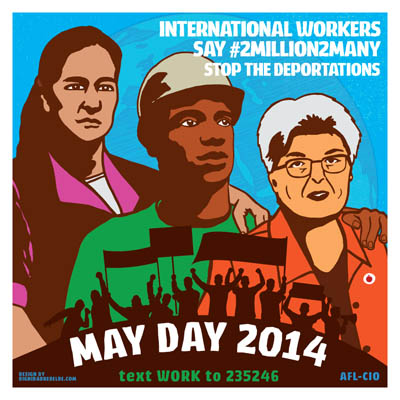 Today as we celebrate International Workers Day, also known as May Day, countless immigrant workers lack necessary protections to prevent and combat work place abuse. Many immigrants are particularly vulnerable to abuse from unscrupulous employers who take advantage of them because they are undocumented or because their immigration status depends on their employment. Immigrant women often face the additional burden of sexual abuse and gender discrimination in the workplace.
Today as we celebrate International Workers Day, also known as May Day, countless immigrant workers lack necessary protections to prevent and combat work place abuse. Many immigrants are particularly vulnerable to abuse from unscrupulous employers who take advantage of them because they are undocumented or because their immigration status depends on their employment. Immigrant women often face the additional burden of sexual abuse and gender discrimination in the workplace.
Margarita* met her U.S. citizen fiancé, Will, through a friend in New York City. During the two years they dated, Will came to visit Margarita and her family in the Dominican Republic every month. Margarita agreed to come to the United States to marry Will, who promised to support and care for her and her two young children. As soon as Margarita arrived, Will forced her and her children to work at his business without pay and raped her. Margarita was not allowed to leave the house or eat without asking permission. Will told her that she would be deported if she went to the police. Eventually, Will allowed Margarita to work outside of his business, but he took all of her wages. When she attempted to leave him, Will got Margarita fired from her household cleaning jobs so she could not achieve financial independence. Through the help of friends, Margarita and her children were able to leave Will after more than a year of abuse. A local shelter referred her to the National Immigrant Justice Center (NIJC), who helped Margarita successfully apply for a T visa for survivors of human trafficking. Margarita and her children are working to rebuild their lives and enjoying their newfound freedom.
Margarita had a deep fear of law enforcement because Will convinced her they would deport her and her children, and she never reported Will’s abuse to the police. But, she finally escaped through her own determination and the help of friends to obtain legal protections. Margarita was luckier than some.
Veronica’s* boss sexually harassed her. He made inappropriate remarks, and touched and kissed her against her will. Veronica bravely came forward and filed complaints with the Equal Employment Opportunity Commission (EEOC) who found evidence of abuse. The company she worked for settled the suit. As a victim of sexual assault, Veronica was eligible to apply for a U visa, which is a special visa for survivors of serious crimes who cooperate in the investigation or prosecution of their abuser. To apply for the visa, Veronica needed to obtain certification that she was the victim of a qualifying crime and helped in the investigation. But when Veronica attempted to get U visa certification from the EEOC, they claimed the harassment she suffered did not constitute criminal sexual assault, force, or threats. In other instances, this type of harassment has led to felony convictions of sexual contact.
Nonetheless, Veronica could not obtain the certification and could not apply for the U visa. After the EEOC’s first denial, she continued to fight for two years with NIJC’s help to no avail. Veronica continues to live in limbo as she works to overcome the abuse she suffered.
Margarita and Veronica’s story illustrates the need to prevent workplace abuse by ensuring that our immigration and labor policies protect the rights of immigrants and women. On this May Day, we fight for the right of all American workers to report abuses without fear of retaliation and to challenge institutions which fail to protect its workers.
*Pseudonym used to protect individual's identity
Jennifer Chan is the associate director of policy at Heartland Alliance's National Immigrant Justice Center.

